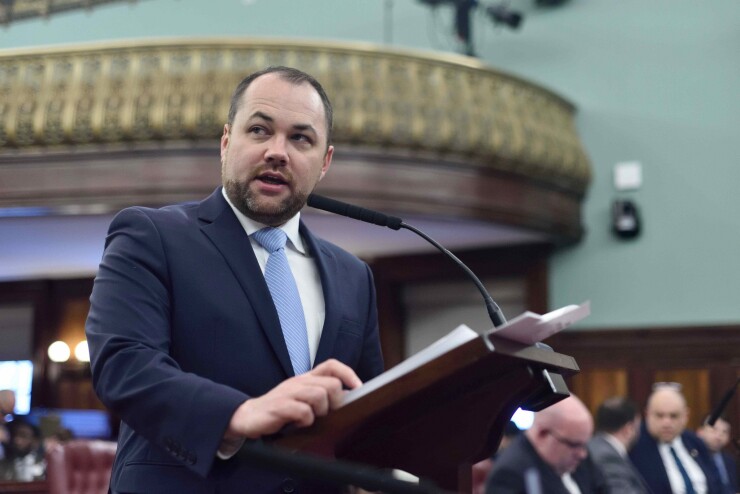The New York City Council on Tuesday filed its
The Council said the city needs higher
De Blasio released his $88.67 billion preliminary fiscal 2019 budget in
The city has about $38.7 billion of general obligation debt outstanding. Moody’s Investors Service rates the city’s general obligation bonds Aa2, while S&P Global Ratings and Fitch Ratings rate them AA. All three assign stable outlooks.

At City Hall on Tuesday, Council Speaker Corey Johnson, alongside Council Finance Chair Daniel Dromm and Capital Budget Subcommittee Chair Vanessa Gibson released their reply. It was Johnson’s first budget recommendation as speaker.
“This budget response shows exactly where the Council’s priorities are – strengthening the social safety net, fighting for the middle class and handling taxpayers’ money responsibly. Everything in here is something the Council believes is worth fighting for and will ultimately make life better for all New Yorkers,” said Johnson.

“Contained within the response are calls for greater accountability. The Council will push the administration to provide greater transparency in the budget particularly as it relates to units of appropriation,” Dromm said. “Additionally, the Council would like to see an expansion of the Citywide Savings Program and would like to have a say in how the budget reductions from the savings program are re-appropriated. It has been difficult to track fringe benefit budgeting because it is across so many different agencies. The Council is asking that fringe benefit funding be held in centralized budgets.”
Gibson said a strong capital budget strengthens infrastructure and our future. “As Chair of the Subcommittee on Capital Budget, I am proud that this budget response makes it clear that the days of front loading agency budgets and floating excessive appropriation carryovers are over," she said. "It’s time to hold agencies responsible for their spending and increase the efficiency, efficacy, and accountability of our capital dollars. Improving the capital process will help us get more projects online and done on time.”
Other recommendations includes:
New York City Housing Authority: The Council called on the de Blasio Administration to provide $2.45 billion in capital funds to NYCHA to address critical needs and invest in housing development on NYCHA land. This investment will include $950 million for boiler repairs and heating equipment technology, $500 million towards the development of senior housing at NYCHA, and $1 billion annually to address ongoing capital needs.
Property taxes: The Council wants a $400 property tax rebate to all homeowners for their primary residences if they make below $150,000. In addition, the Council is calling on the Administration to create a property tax reform commission to examine and propose long-term solutions to the system’s inequities.
MTA Fair Fares: The Council says the Administration should fund a program to provide half-fare MetroCards to individuals and families living below the poverty level so that about 800,000 low-income people could save up to $726 per year.

Direct Education Dollars to Schools: All public schools should be brought to 100% of their Fair Student Funding level – which is the bulk of funding for public schools – so that the academic needs of the city’s 1.1 million public school students can be adequately supported and prioritized by the principals.
Prioritize Permanent Housing: In light of the high spending on homelessness, the Council is calling for a reassessment of homeless shelter spending and reallocation of funding to programs that support move outs from the shelter system, including the City Family Exit Plan Supplement, Living in Communities and the construction of supportive housing.
Addresses Unfunded State Mandates: In the state budget adopted on April 1, the state imposed several unfunded mandates on the city which are not reflected in the budget and which must be included to present an accurate picture of the city’s financial plan. These inclide $254 milion for the MTA Subway Action Plan, $200 million for Raise the Age and $31 million for Close to Home.
Freddi Goldstein, the Mayor's Deputy Press Secretary, said "Times are increasingly tight, and the $418 million dollars we just spent to fix the state-run subways, which the Council supported, will only make this year’s budget process all the more lean."

The preliminary budget released in early February marked the initial step in the budget process. The 51-member City Council held a round of hearings on it over the past several weeks and submitted its response on Tuesday. Next the mayor will release his executive budget later this month – an updated proposal based on the Council’s response. The Council will then hold a second round of hearings after which the council and the mayor will negotiate adjustments to the executive budget. Agreement must be reached on a final budget before July 1, the beginning of the next fiscal year.





